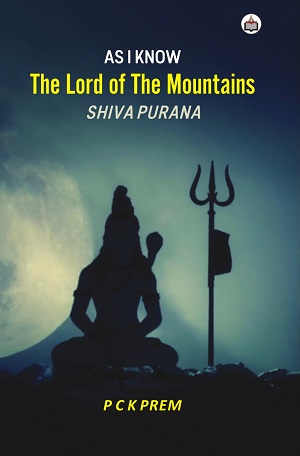Oct 01, 2025
Oct 01, 2025
by P C K Prem
As I Know: The Lord of the Mountains – Shiv Purana: 34
Agony of Daksa is immense because deliverance of sons perturbs. To become cause of birth is a sacred duty, for it salvages and grants deliverance to a soul of another yoni …and later to fulfill a divine purpose, the lord blesses Daksa with sixty daughters
 Daksa was deeply hurt and experienced pains of separation of wise sons Harayasavasas and Sabalasvasas, who he wanted, would attain deliverance after discharging mandatory duties toward man, relations and society. He wanted them to produce sons so that they are free from the debt of a father. A man is supposed to do duties and discharge varied responsibilities so that he pleases gurus, elders and gods. Such essential functions are obligatory ingredients to embark upon the path of salvation. A man, who gives birth to a living being, obliges a soul of another yoni and thus, it is the function of a child to pay back debt as enshrined in Scriptures.
Daksa was deeply hurt and experienced pains of separation of wise sons Harayasavasas and Sabalasvasas, who he wanted, would attain deliverance after discharging mandatory duties toward man, relations and society. He wanted them to produce sons so that they are free from the debt of a father. A man is supposed to do duties and discharge varied responsibilities so that he pleases gurus, elders and gods. Such essential functions are obligatory ingredients to embark upon the path of salvation. A man, who gives birth to a living being, obliges a soul of another yoni and thus, it is the function of a child to pay back debt as enshrined in Scriptures.
Supreme Brahma was genuinely concerned about the mental agonies of Prajapati Daksa and so wanted to sympathize. He decided to pacify the anger of son Daksa and so, arrived at his ashrama. He said many words of love and affection and tried to appease Daksa. At the same time, he tried to dispel doubts of Daksa, which disturbed when he had heard about the irritating, hurting and destructive conduct of sage Narada. Thus, Daksa understood and turned soft toward Narada when Brahma worked hard to convince that sage Narada was innocent. Supreme Brahma did it because he knew sage Narada was also his son, the greatest among the monks and further, the celestial sage was beloved of all the gods and goddesses of heavens.
Thus, Supreme Brahma brought estranged sons together and Daksa was quite happy but within, the loss of sons pestered and troubled. Brahma advised him to create prajas, which was a sacred duty assigned to him. In due course of time, through the womb of his woman, he produced sixty beautiful daughters. He adhered to the principles of dharma and brought up daughters religiously without feelings of envy, languor or indolence. Later on, when the young daughters attained puberty and youth, he married them off as per the dictums of scriptures.
All daughters were married to men of great tapa and penance. He married ten daughters to Dharma, a blessed soul of truth and righteousness. Thirteen young daughters were married to sage Kasyapa. To lord Chandrama, he offered twenty-seven daughters in marriage and happily, he offered two daughters each to Bhuta, a son of Brahma, sage Angira and Krisasava. Other four daughters were married off to sage Aristanemi.
The three worlds were full of children of dedicated daughters, who had strictly followed dynastic traditions. It was increase of generation for obvious reasons and fulfilled a divine purpose. Some of the learned people consider Shiva or Sati, as the eldest daughter of prajapati Daksa. Some think Sati younger to the next elder, and still others feel she is the youngest. A difference in Kalpa makes the variation. Learned men consider acceptable the distinction arising out of kalpa.
After birth of sons and daughters, prajapati Daksa along with wife remembered goddess Jagdamba and conveyed sincere gratitude at the great mercy. Thereafter, he praised goddess with folded hands and bowed humbly before the goddess many a time. Goddess was very pleased and so, in order to carry out the pledge, she decided to take birth through the womb of Veerani, one of the wives of Daksa.
With the blessings of goddess, Daksa appeared brilliant with divine glow and then, after finding a propitious moment, he established seed in the womb of his queen and thus, the most merciful, the most generous and the most magnificent goddess Shiva began to live in the mind and heart of Daksa’s consort. She developed signs of a pregnant woman. Now, the wife of Daksa was filled with divine beauty and glee, for she knew, a goddess was going to take birth.
With the benign celestial impact, Veerani become the most favourable and sanctified woman. During the consecrated period, Daksa completed various religious and divine dictums and the sacred acts infused inspiration and courage in the mind and heart of family and community with due regard for the Vedic principles. While he was engaged in sacred karmas, Daksa organised a great festival and offered lot of wealth to brahmins as dakshina. Happy days of festivals and celebration did not end for Daksa, for holy goddess Shiva blessed, and on the other hand, she was destined to take birth as Daksa’s daughter.
To be Continued
12-Mar-2022
More by : P C K Prem